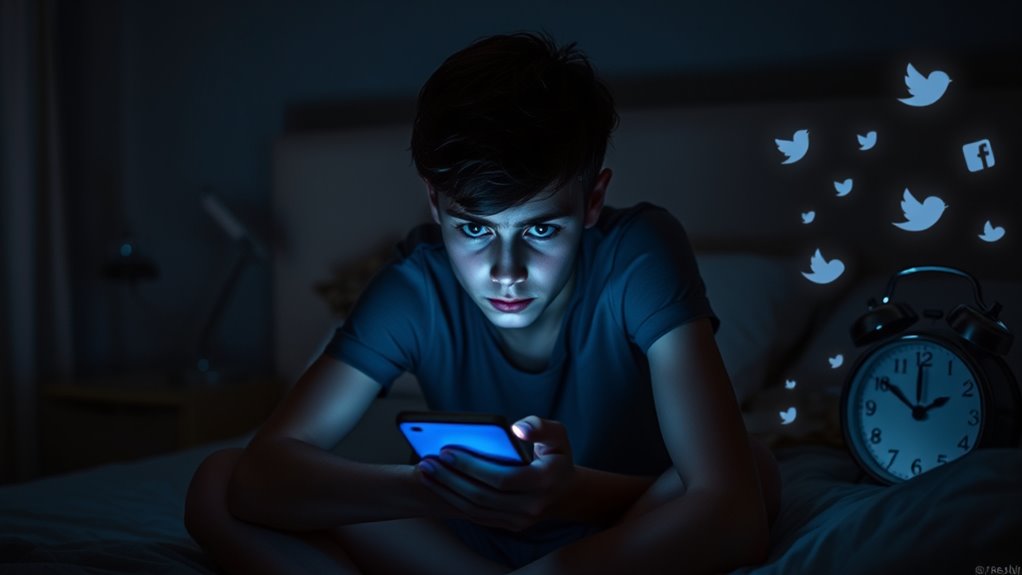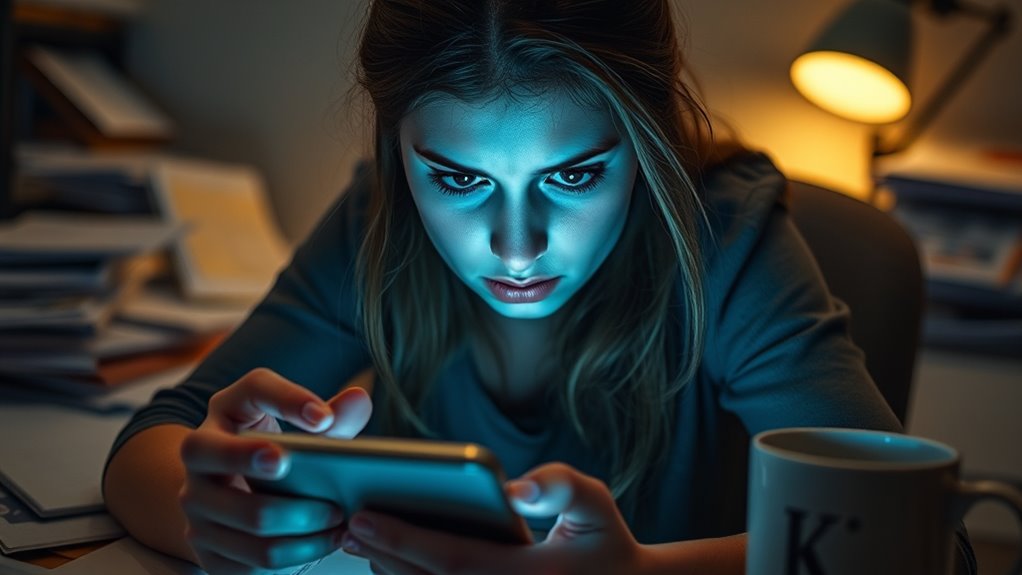Research shows that using social media can increase anxiety by fueling self-comparison, insecurity, and negative self-talk. To break this cycle, consider taking digital detoxes, setting boundaries, and focusing on real-world activities and goals. Recognizing your patterns and limiting exposure helps improve mood and mental clarity. If you want to discover effective strategies to manage social media use and protect your well-being, keep exploring how to regain control and foster healthier habits.
Key Takeaways
- Studies link social media use to increased anxiety through peer comparison and exposure to curated content.
- Recognizing patterns of social media-induced comparison is essential for breaking the cycle.
- Digital detoxes and short breaks reduce exposure to content fueling insecurities and negative self-talk.
- Limiting social media to specific times and replacing scrolling with hobbies promote mental well-being.
- Incorporating mindfulness and offline activities helps restore emotional balance and reduces dependency on online validation.

In today’s digital age, social media has become a ubiquitous part of daily life, but its widespread use can also contribute to increased feelings of anxiety. When you spend hours scrolling through feeds, it’s easy to fall into the trap of peer comparison, where you measure your worth against what others showcase online. Seeing friends post about their successes, vacations, or new possessions can make you feel inadequate or left behind, fueling insecurities that heighten anxiety. Recognizing this pattern is the first step toward managing its impact. One effective strategy is to contemplate a digital detox—taking intentional breaks from social media to reset your mind and regain perspective. Even short periods away can help reduce the constant influx of curated content that fuels comparison and self-doubt.
During a digital detox, you allow yourself space to focus on real-world interactions and activities that bring genuine fulfillment. Instead of measuring your life against polished images and highlight reels, you reconnect with your own goals and values. This break can also diminish the anxiety that comes from constantly checking notifications or comparing your life to others’. As you step back from the digital noise, you may notice a decrease in negative self-talk and a greater appreciation for your progress, regardless of how it compares to others. The key is to set clear boundaries—such as limiting social media use to certain times of the day or designating tech-free zones in your home. These habits help you regain control over your digital consumption and reduce the compulsive urge to check updates incessantly.
It’s important to remember that social media platforms are designed to be addictive, often amplifying feelings of inadequacy and anxiety through peer comparison. By intentionally limiting your exposure, you create space for healthier mental habits. Replace mindless scrolling with activities that boost your well-being—like exercise, reading, or hobbies that make you feel accomplished. Over time, you’ll start to notice how much less impact peer comparison has on your mood. Additionally, practicing mindfulness during social media use can help you become more aware of how these platforms affect your emotional state, empowering you to make more conscious choices about your engagement. Ultimately, breaking the cycle involves understanding the influence social media has on your mental health and actively choosing to prioritize your well-being over curated online personas. Recognizing the role of antique decor and other calming environments can also promote relaxation and reduce anxiety in your daily life.
Frequently Asked Questions
Can Reducing Social Media Use Improve Long-Term Mental Health?
Reducing social media use can substantially improve your long-term mental health. By taking a digital detox, you give your mind a break from constant notifications and comparisons. Incorporate mindfulness practices to stay present and reduce anxiety. These steps help break the cycle of dependency, boost your mood, and build resilience. Over time, you’ll feel more balanced, focused, and better equipped to handle stress, leading to healthier mental well-being.
Are Certain Platforms More Linked to Anxiety Than Others?
Sure, some platforms are like the drama queens of anxiety—think Instagram and TikTok, with their constant comparison and fleeting validation. Platform comparison shows they often impact your content more intensely, fueling stress. Meanwhile, platforms like Twitter can be a battleground for negativity. So, yes, certain platforms are more linked to anxiety due to their content impact, and being mindful about your usage can help keep your mental health from spiraling out of control.
How Does Social Media Affect Teenagers Differently Than Adults?
You notice that social media affects teenagers differently than adults because peer influence and identity development play bigger roles. Teenagers often seek approval and compare themselves to peers, which heightens anxiety. Their ongoing identity development makes them more impressionable to online feedback. Adults tend to use social media more consciously, so the impact on their anxiety levels is usually less intense. This difference shapes how each group experiences social media’s effects.
What Are Effective Strategies for Managing Social Media-Related Anxiety?
Ever find yourself scrolling endlessly, feeling anxious? Try a digital detox to break the cycle and reduce stress. Incorporate mindfulness techniques, like deep breathing or grounding exercises, to stay present. Set specific time limits for social media use and take regular breaks. These strategies help you regain control, lessen anxiety, and foster a healthier relationship with your devices, making your online experience more positive and manageable.
Does Social Media Use Impact Sleep Patterns and Overall Well-Being?
Yes, social media use can disrupt your sleep patterns and affect your overall well-being. To improve, consider a digital detox before bed, avoiding screens at least an hour before sleep. Practice good sleep hygiene by creating a calming bedtime routine and keeping your phone out of reach. These steps help your mind relax, leading to better sleep quality and enhanced mental health.
Conclusion
As you scroll through social media, imagine the flickering screens casting shadows over your peace, trapping you in a cycle of anxiety. But you can break free—step back from the glow, breathe in fresh air, and reconnect with the world beyond the screen. Your mind deserves space to breathe and heal. Take control today, and let the sunlight chase away the shadows, restoring calm to your life.









